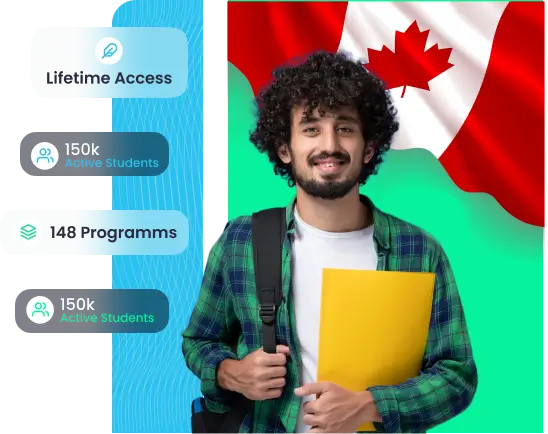Enter OTP


Embark on a transformative educational journey in Canada, renowned for its academic prestige, cultural richness, and exceptional quality of life. Studying in Canada not only offers a superior learning environment but also broadens horizons with diverse opportunities. For countless individuals, choosing Canada as their study destination marks the beginning of a promising path towards future success and potential residency.
Canada consistently ranks among the top countries for quality of life, boasting high standards of healthcare, safety, and overall well-being for its residents and students alike.
Canada is home to some of the world's leading universities, with institutions like the University of Toronto, McGill University, and the University of British Columbia. 5% of the top global universities are in Canada.
Experience a melting pot of cultures in Canada, where over 200 ethnic origins coexist harmoniously. This cultural richness provides a dynamic and inclusive environment for students to learn and grow.
Canada offers ample opportunities for international students to gain valuable work experience during and post their studies through co-op programs, internships, permanent employment.
In Canada, co-operative education (co-op) programs provide students with comprehensive opportunities across diverse fields. These programs seamlessly blend academic.. read more
Canada offers pathways for skilled international graduates to obtain permanent residency, enabling them to build their careers and contribute to Canadian society long-term.
Studying in Canada is very attractive to international students because Canadian universities, especially public ones, generally have lower tuition fees for both domestic and international students.
Canada also provides international students with scholarships, grants, and financial aid options, which help reduce the cost of studying abroad and make Canadian education more accessible globally.
Canada ranks among the safest countries globally, providing international students with peace of mind and a secure environment to pursue their studies.
Undergraduate applications for universities in Canada are managed through different admission presses such as OUAC (Ontario Universities Application Centre) and EDUplanner BC, & few can be applied directly varying by province.
For master's students, applications in Canada are typically submitted directly through the university's online portals.
International students applying to study in Canada typically need to provide academic transcripts from their previous educational institutions.
Some universities in Canada may require a WES (World Education Services) evaluation for international applicants' transcripts to assess their educational credentials.
International students applying to study in Canada often need to submit letters of recommendation as part of their application process. These letters, typically from professors, employers, who can attest to the student's academic abilities, work ethic, character, and potential for success in the chosen program.
The requirement for a personal statement or statement of purpose varies depending on the university and program.
The primary intake for studies in Canada typically occurs in September, although students also have the flexibility to begin their programs in January and May, offering more options for starting their academic journey.
Non native speakers may be required to prove their English language proficiency by completing tests like IELTS,TOEFL, CAEL & PTE.
To study in Canada, international students must obtain a study permit from Immigration, Refugees, and Citizenship Canada (IRCC).
The visa fee for Canada is 150 CAD, with an additional 85 CAD required for biometrics processing.
 Cost of Living
Cost of LivingThe cost of living in Canada varies depending on factors such as location, lifestyle, and accommodation choices. On average, international students can expect to spend between CAD 15,000 to CAD 25,000 per year on living expenses, including accommodation, food, transportation, and personal expenses.


Bachelor's Degree: Tuition fees for undergraduate programs in Canada range from CAD 30,000 to CAD 70,000 per year, depending on the program and institution. For example, the University of Waterloo undergraduate tuition fees for international students is approximately CAD 66,000 per year.

Master's Degree: Graduate program tuition fees in Canada vary widely based on the field of study and the institution. On average, international students can expect to pay between CAD 30,000 to CAD 60,000 per year for master's programs. For example, the University of Canada West, Master’s tuition fees for international students starts at approximately CAD 34,000 per year.
International students studying in Canada have the opportunity to work part-time during their studies, with a limit of up to 20 hours per week, and full-time during scheduled breaks. Upon graduation, they can apply for post-graduation work permits (PGWP) that enable them to work in Canada for up to three years, gaining valuable professional experience in various industries.



A Canadian degree holds significant value globally, making you a competitive candidate for employers. Your experience gained through internships, co-ops, or part-time jobs during studies becomes even more valuable.
Canada has a growing need for skilled professionals in STEM fields (Science, Technology, Engineering, and Math). Healthcare, business, and information technology also offer strong opportunities.
PR: The process for Permanent Residency (PR) in Canada for international students can be navigated through the Express Entry system, with the Canadian Experience Class (CEC) being a popular pathway.
Canadian universities emphasize a student-centered approach to education, focusing on experiential learning, critical thinking, and research-based teaching methods. With small class sizes and accessible faculty members, students receive personalized attention and support to excel academically.
*(Varies as per Country & Age)
The student visa process for the canada involves several steps and document requirements
Embark on a transformative educational journey in Canada, where academic excellence meets cultural diversity and limitless opportunities for growth and success. With world-class universities, a high quality of life, and a welcoming environment for international students, Canada is the perfect destination to pursue your academic and career aspirations.

Embark on your educational journey with confidence! Our team of admission experts is here to guide you through the process. Book a free session now to receive personalized advice, assistance with applications, and insights into your dream school. Whether you're applying to college, graduate school, or specialized programs, we're here to help you succeed.
